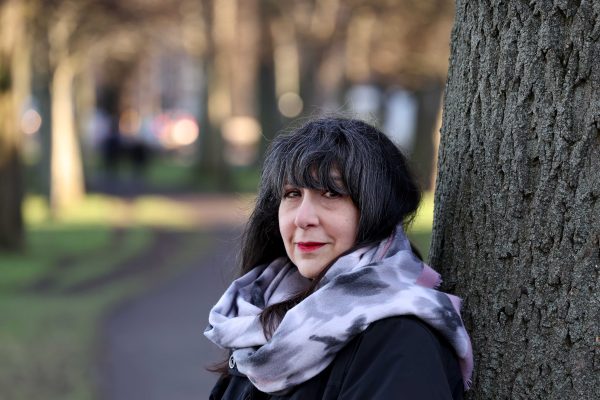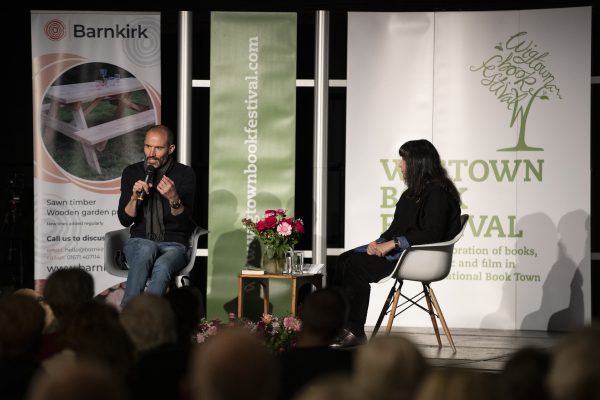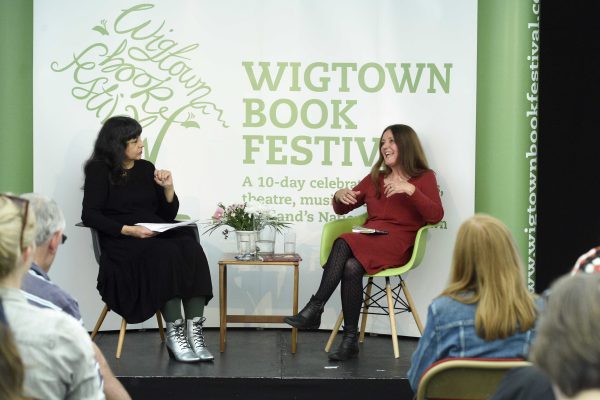Four Questions with Lee Randall
Guest Festival Programmer Announced

Lee Randall, a long-time friend of Wigtown, has just been appointed as Guest Programmer taking on the challenge of curating this year’s 25th annual book festival. She’s a well-known figure in Scottish literature, publishing and media – meaning she’s perfectly placed for the task. We asked Lee a few questions about herself, about Wigtown and book festivals more generally.
You've had a long association with Wigtown Book Festival, when did that start and why has it grown?
I met Adrian Turpin at the turn of the century, when we were both involved in journalism. Our work and friendships overlapped—in fact, I think I took over his role at Scotland on Sunday working on Spectrum magazine. My focus was arts- and features-related, meaning. I regularly interviewed and reviewed writers and other creatives. I’d also done some chairing at Edinburgh International Book Festival and the Borders Book Festival.
Adrian, then living in Wigtown, invited me to come chair at the festival. It was 2006 or 2007, shortly before he became the artistic director. I got in the habit of working across both weekends, dashing back to Edinburgh and my day job during the week. After taking voluntary redundancy in 2013 I had a lot more time to give to the festival and, let’s be honest, needed the work, as well. Freelance life is a scramble.
The more you do, the more there is to do. There were many conversations about books I’d read and authors I’d chaired, which occasionally fed into the programme in an informal way. During the pandemic I was able to step up, tackling a lot of digital chairing for the festival, and writing pieces for the website.
In 2022, I helped pull together the programme for the Big Bang festival. (I love science, even when I don’t understand it. People don’t always think about what a creative field it is). Throughout last year — with a break to programme Borderlines Carlisle — I helped pull together the autumn programme, and in September, pitched up as usual to tackle a range of chairing duties.
Visits to Wigtown are a highlight of my calendar. I hum a gleeful little song on the day I travel west (to the tune of Graceland, but don’t tell Paul Simon):
“I’m going to Wigtown, Wigtown/in Dumfries and Galloway.”
Trust me, it scans, if you shove it a bit.
Like many others, I was besotted by the beauty of the town and its bookshops, and chuffed by the warm welcome I received — which has grown warmer and more comforting with each year. Feedback from festival attendees has been heartening, and I’ve made numerous good friends among the local population. One of my cats was even born in Wigtown.
I’m not joking when I say that a piece of my heart resides there year-round. Wigtown is my home from home.


Why is it you have such a love of book festivals?
I’ve always dreamed of hosting a Salon, where clever, eccentric, talented people gather to tell stories, share ideas, flirt, fight, and riff on the zeitgeist. Book festivals offer all that and more: you get to go home with piles of books (or inspiration for your next trip to the library)!
As a programmer and chairperson, it’s a privilege becoming a bridge between writer and reader. I’m regularly moved by overheard conversations from the signing queue — a reader’s delight at meeting the person who’s given them years of pleasure, and an author’s validation that all those hours alone in a room wrestling their thoughts into coherence have connected with the wider world.
I love the sense of community books festivals provide, a reminder that while my relationship with a piece of writing is intensely personal, my love of books and writers links me to millions of others. The world’s a divisive place: we need more reaching out and more bridges.
What makes Wigtown, and this 25th event, so special
I was in the audience trying not to weep during the event held to commemorate the festival’s 20th anniversary. The story of Wigtown’s renaissance — from the bold vision to apply to become Scotland’s National Book Town, to its ongoing realisation — is inspiring. Given the myriad challenges of keeping a festival afloat, of keeping it relevant and vibrant, of integrating the interests of local residents with the circus we bring to town, and of satisfying regular visitors while attracting new ones, well, hitting the quarter century mark is an epic achievement worth celebrating.
When I do the sums, I see I’ve been lucky enough to play a role in more than half of these 25 years. What an honour to help paint the town silver this coming autumn!
You have experience in many areas of literature and the media - would it be fair to say that storytelling is in your blood?
Yes! I grew up in a house filled with books; and have vivid memories of helping my father build a wall of shelves for my bedroom, just like the shelves dominating every other room of the house. Dad taught me to read by getting me to write a book, entitled My Family. Once I started reading, I couldn’t stop—and wouldn’t want to. It was a natural leap to writing my own stories, and others, via the journalism I’ve done over the years. I’m one of those people who feels an experience isn’t quite real until it’s been captured on paper or recounted as a tale to amuse—or horrify—my friends. A former boss once said; “You lead such an interesting life.”. “No more exciting than anyone else’s,” I replied; “It’s just all in the telling!”.
And nothing pleases me more than a well-told tale, be it fact or fiction.
Interview by Matthew Shelley